|
|
|
Sort Order |
|
|
|
Items / Page
|
|
|
|
|
|
|
| Srl | Item |
| 1 |
ID:
110767
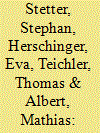

|
|
|
|
|
| Publication |
2011.
|
| Summary/Abstract |
In the current literature in International Relations and Conflict Studies, water as a source of conflict is either extremely over- or exceedingly underrated. In order to account for the dynamics of water conflicts, it is argued in this article that the study of water conflicts should be linked to comprehensive theories of social conflict and world society. A theoretical framework is developed based on a combination of securitization theory, modern systems theory and sociological neo-institutionalism. The usefulness of this framework is illustrated through two empirical cases of water conflicts, namely Spain and Egypt/Sudan. This study contributes to an understanding of the evolution of water conflicts as a result of securitization practices, the dynamics of these conflicts as complex social systems and as the outcome of local adaptations to and of 'world cultural' frames.
|
|
|
|
|
|
|
|
|
|
|
|
|
|
|
|
| 2 |
ID:
073976
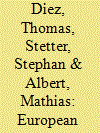

|
|
|
|
|
| Publication |
2006.
|
| Summary/Abstract |
Our article analyzes the impact of the European Union (EU) on border conflicts, in particular how integration and association are related to conflict transformation. We approach this issue from a theoretically as well as empirically grounded constructivist perspective. On this basis we propose a stage model of conflict development, based on the degree of securitization and societal reach of conflict communication. We argue that the EU can transform border conflicts and propose a four pathway-model of EU impact. This model comprises forms of EU impact that are, on the one hand, either actor-driven or indirectly caused by the integration process and have, on the other hand, as their main target either particular policies or the wider society in border conflict areas. We then apply this model to a comparative study of border conflicts, thereby analyzing the conflicts in Northern Ireland, Greece-Turkey, Cyprus, Europe's North (EU-Russia) and Israel-Palestine. We finish with a specification of the conditions of positive and negative EU impact.
|
|
|
|
|
|
|
|
|
|
|
|
|
|
|
|
| 3 |
ID:
077547


|
|
|
|
|
| Publication |
2007.
|
| Summary/Abstract |
This article argues that while globalization theory is far from being past its most productive phase, as some of its critics claim, it does exhibit a number of shortcomings, particularly when it comes to identifying a clear point of reference for what is taken to be globalized and applying theoretical concepts developed in the analysis of national societies to a global level. This article argues that globalization theory stands on solid ground in that globalization theory has developed four strands of research, which are fairly well developed and which distinguish it as a separate field of inquiry, these four strands being the understanding of globalization as inherently varied globalization, global governance research, global history, and global/world society research. It argues that in order to redress some of the problems of globalization theory, it is necessary to build on these four strands and merge them with the traditional sociological concepts of functional differentiation and rationalization as well as with insights from complexity theories.
|
|
|
|
|
|
|
|
|
|
|
|
|
|
|
|
| 4 |
ID:
157795
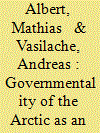

|
|
|
|
|
| Summary/Abstract |
Linked to the image of a wild and still-to-be-explored territory, as well as to images of the region as one of new economic opportunities, discourses on the Arctic also tie in with issues of climate change, cooperation and conflict, Arctic governance, international law and the situation and rights of indigenous people, as well as Great Power politics. Taken together, these aspects characterize a region whose formation is different from regionalization processes in other parts of the world. As the regional peculiarity of the Arctic is reflected by a variety and plurality of representations, discourses, perceptions and imaginaries, it can usefully be analyzed as a region of unfolding governmentality. The present article argues that the prospects for the Arctic are strongly intertwined with perceptions and depictions of it as an international region subject to emerging practices of governmentality. By drawing on both Foucault’s texts and governmentality studies in international relations (IR), we discuss how the Arctic is affected by governmental security rationalities, by specific logics of political economy and order-building, as well as becoming a subject for biopolitical rationalizations and imaginaries. The discourses and practices of governmentality that permeate the Arctic contribute to its spatial, figurative and political reframing and are aimed at making it a governable region that can be addressed by, and accessible for, ordering rationalities and measures.
|
|
|
|
|
|
|
|
|
|
|
|
|
|
|
|
| 5 |
ID:
124447


|
|
|
|
|
| Publication |
2013.
|
| Summary/Abstract |
This article explores some basic issues which arise from International Relations (IR) theory also being a form of social theory in a broader sense. Many of these issues are related to the question of a "social whole," that is, whether international relations/International Relations is one of many parts of a social whole, on what grounds it is differentiated from other parts, and whether it operates on a distinct level of social reality. We argue that these questions have been addressed in many forms of IR theory, but mostly only implicitly, and that the failure to make explicit assumptions about a social whole is probably due to the relative neglect of the subject in modern Sociology. The article argues that implicit assumptions about a social whole can be unearthed by looking at the concepts of systems, levels, and sectors, discussing debates about each of these in turn. Openly addressing IR theory as social theory, and spelling out images of a social whole, allows one to gain a sharper understanding of some of the basic analytical categories used, and to judge whether they form plausible delimitations of social reality within a wider social context.
|
|
|
|
|
|
|
|
|
|
|
|
|
|
|
|
| 6 |
ID:
157609


|
|
|
|
|
| Summary/Abstract |
This article deals with the subject matter of International Relations as an academic discipline. It addresses the issue of whether and how one or many realms could legitimately be claimed as the discipline’s prime subject. It first raises a number of problems associated with both identifying the subject matter of IR and ‘labelling’ the discipline in relation to competing terms and disciplines, followed by a discussion on whether, and to what degree, IR takes its identity from a confluence of disciplinary traditions or from a distinct methodology. It then outlines two possibilities that would lead to identifying IR as a discipline defined by a specific realm in distinction to other disciplines: (1) the ‘international’ as a specific realm of the social world, functionally differentiated from other realms; (2) IR as being about everything in the social world above a particular scale. The final section discusses the implications of these views for the study of International Relations.
|
|
|
|
|
|
|
|
|
|
|
|
|
|
|
|
| 7 |
ID:
175129
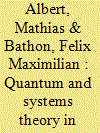

|
|
|
|
|
| Summary/Abstract |
This article provides a sympathetic, yet also somewhat critical, engagement with the notion of ‘quantizing’ by exploring substantive overlaps between quantum and systems theory. It is based on the observation that while quantum theory is ‘non-classical’ in its entire world-view, there is a danger that when it comes to the social world it is simply laid on a world-view of that world, which remains at its core ‘classical’. This situation calls for engaging quantum with existing non-classical social theories. Resemblances between quantum and systems theory are obviously given through similarities around the concepts of observation and meaning, whose status and function in both bodies of theory is explored. We then probe the degree to which obvious analogies in fact could be read as overlaps and similarities that could be put to complementary analytical use: in a sense, we argue that systems theory ‘does’ quantum theory, and vice versa. The article concludes with some vistas of this discussion for the field of international relations.
|
|
|
|
|
|
|
|
|
|
|
|
|
|
|
|
| 8 |
ID:
109593
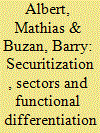

|
|
|
|
|
| Publication |
2011.
|
| Summary/Abstract |
So far, securitization analysis has proceeded on the basis of an assumption that there are sectoral differences between securitization dynamics. However, sectors in this context were primarily seen as analytical 'lenses', as complexity-reducing cuts through a complex social reality. In this article, we first reflect on the ontological status of 'sectors'. Do they represent functionally differentiated realms of world politics or world society, or do sectors and functional realms need to be separated from one another clearly? After giving a short introduction to the notion of 'functional differentiation' in international relations and briefly reflecting on the ontological/analytical distinction, we scrutinize the relation between sectors and functionally differentiated realms of society. Although sectors hang together with functional differentiation, much depends on the version of functional differentiation theory used. In the communication theoretical version, securitization would be firmly located within the political system. References to functionally specific sectors would then - contra Waltz - point not only towards functional differentiation between the political and other functionally defined realms of (international) society, but also towards ongoing functional differentiation within the (international) political system.
|
|
|
|
|
|
|
|
|
|
|
|
|
|
|
|
| 9 |
ID:
177950


|
|
|
|
|
| Summary/Abstract |
Realist and rationalist approaches to balance of power politics underplay the degree to which balances are socially constructed. We develop a constructivist approach that accounts for the elusive and contentious nature of the balances that states seek to balance. The approach foregrounds contests over balance interpretations between states that shape whose conceptions and assessments underpin the making and remaking of balances. We argue that shifts in balancing practices are crucial to the dynamics of these contests. To substantiate this argument, we empirically study the contests over the conventional and theatre nuclear balances between East and West in the last two decades of the Cold War. The case study shows that the conventional and theatre nuclear arms control negotiations – that is, the partial shift from adversarial to associational balancing – initially fuelled and amplified both contests. At the same time, the arms control negotiations eventually resolved the contests through the development of shared understandings of the two balances, thus ending the adversarial balancing between East and West. Overall, we contribute to theory development on balance of power politics by highlighting the importance of contests over balance interpretations and by providing insights into the politics and dynamics that shape these contests.
|
|
|
|
|
|
|
|
|
|
|
|
|
|
|
|
| 10 |
ID:
113728


|
|
|
|
|
| Publication |
2012.
|
| Summary/Abstract |
In some contrast to the traditional and ongoing normative discussions about the desirability of a world state, new and more explicitly geo-historical questions about world political integration are being posed, especially (i) whether elements of world statehood are in existence already, (ii) whether a world state is in some sense inevitable, and (iii) whether, and under what conditions, a world state would be sustainable? For instance, the existing and emerging structures of global governance, of a global public sphere and global constitutionalism can be argued to converge to form at least nascent forms of world statehood. Building on and complementing such diagnoses of existing forms of world statehood, the question arises about whether there are possible and likely, or even inevitable, futures in which the emergence of more 'thick' forms of a world state, understood as a more tightly and substantially integrated expression of political community, could evolve. This possibility raises further questions about the legitimacy, viability and sustainability of such a state form. After a brief overview of these issues, the Introduction provides a preview of the following contributions of this special issue as well as the distinction between the 'global' and the 'world' as one possible future research trajectory in the present context.
|
|
|
|
|
|
|
|
|
|
|
|
|
|
|
|
|
|
|
|
|